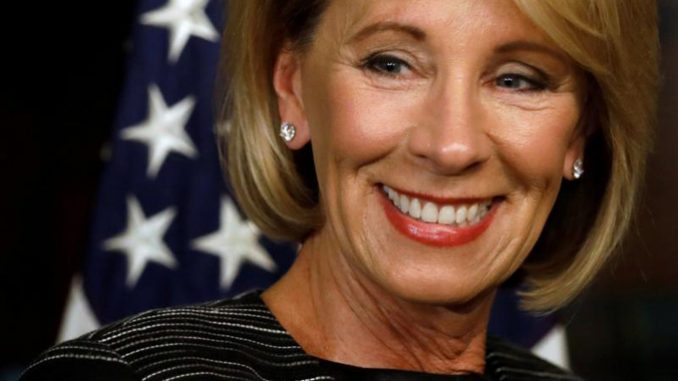
On Friday, September 22, Department of Education Secretary Betsy DeVos ended the Obama-era abuses of Title IX policy guidelines that unfairly stacked the deck against those accused of campus sexual assault. For those—mostly males—who have endured the biased campus “courts” that had been hastily constructed in order to comply with the Department of Education’s Office of Civil Rights guidelines, this is welcome news. Ending what DeVos has called “the era of rule by letter” begun by the Obama administration in its 2011 “Dear Colleague” letter, which mandated campus tribunals to investigate allegations of campus sexual assault, the education secretary concluded that instead of working with schools on behalf of students, the Obama administration had “weaponized the Office for Civil Rights (OCR) to work against schools and students.”
DeVos understands that the implementation of the Obama administration’s “Dear Colleague” letter in 2011 has resulted in the violation of the civil rights of those accused of campus sexual assault crimes. The Obama-era directives discouraged cross-examination, it also forbade schools from relying on investigations of criminal conduct by law enforcement authorities to resolve Title IX complaints. Policing and judicial systems were mandated, while at the same time OCR demanded that schools resolve complaints on an expedited basis. Worse, the 2011 letter provided that any due process protections afforded to accused students should not “unnecessarily delay” resolving the charges against them. Those who were accused of sexual abuse were often denied the ability to appeal a guilty verdict, yet, the accuser could appeal a “not-guilty” finding against the individual she/he had accused—ensuring that accused students end up being retried even after they have been cleared of wrongdoing. And under the 2011 guidelines, “guilt” was based upon the far weaker standard of the “preponderance of evidence” rather than the stronger standard of “clear and convincing” evidence of guilt.
Under the new directives, colleges and universities are allowed to use the stronger standard of evidence. And, most importantly, colleges and universities are now allowed to facilitate an informal resolution process, such as mediation, as long as all parties agree to it. According to the previous guidelines, such informal resolution was disallowed because the OCR decreed that mediation was not appropriate, even on a voluntary basis, in cases involving alleged sexual assault.
As participants in federal grant programs for research, and loan programs for students, Catholic colleges and universities are also bound by the same Title IX mandates. And it seems that some Catholic institutions have engaged in the same kinds of abuses of the civil rights of accused students as secular schools. According to recent research by the Foundation for Individual Rights (FIRE), an organization dedicated to defending individual rights on America’s college and university campuses, some of the most prestigious Catholic colleges in the country have routinely violated the civil rights of students on their own campuses by withholding due process protections from students accused of sexual assault.
Released earlier this month, FIRE’s “Spotlight on Due Process 2017” provides a rating of the top 53 universities in the country (as identified by U.S. News and World Report) based on 10 fundamental elements of due process. FIRE found that nearly three quarters (74 percent) of America’s top 53 universities do not guarantee accused students that they will be presumed innocent until proven guilty. Fewer than half of the schools (47 percent) require that the fact-finders—the institutions’ version of judge and or jury—be impartial. Seventy-nine percent of the 53 rated universities received a D or F for protecting the due process rights of students accused of sexual misconduct.
Some of the most prominent Catholic colleges in the country received the lowest ratings for providing due process rights to individuals accused of sexual misconduct. For example, Boston College, one of the highest-ranked Catholic colleges by U.S. News and World Report, received an F rating from FIRE, for failing to provide a clearly stated presumption of innocence, adequate written notice of allegations, adequate time to prepare for the disciplinary process—including notice of the hearing date—and a prohibition on conflicts of interest that could compromise the integrity of the process. Georgetown University and the University of Notre Dame each received a D rating. Neither Georgetown, nor Notre Dame, nor Boston College provide the accused with a right to counsel. Still, these three schools fared better than Washington University in St. Louis, which received the lowest score of all 53 schools rated by FIRE. Washington University provides none of the procedural safeguards for due process in cases of alleged sexual assault.
Of the 53 most prestigious schools in the country, none received an A grade in the FIRE report. Two institutions (Cornell and UC Berkeley) received a B for their policies to protect students, and an additional six—including one lone Catholic university, Villanova—received a C rating.
Villanova provides many of the due process protections to those accused of sexual assault that Boston College, Georgetown, and Notre Dame deny. In contrast to Boston College, Villanova provides accused students with the right to impartial fact-finders, including the right to challenge fact-finders’ impartiality, and also provides access to all relevant inculpatory and exculpatory evidence at hearing. Unlike Georgetown, Notre Dame, and Boston College, Villanova provides accused students adequate time to prepare for all phases of the disciplinary process, including notice of the hearing date, and access to all evidence to be considered at the hearing five business days in advance. If the accused student is required to respond to the allegations, he or she must receive notice at least five business days in advance. Villanova also prohibits conflicts of interest that could compromise the integrity of the process, ensuring the advocates for the accuser cannot serve as investigators or fact-finders, and fact-finders must not hear the appeal.
At my own institution, the Franciscan University of Steubenville, the Title IX coordinator has worked closely with student affairs staff, ministry staff, and faculty to place the training required by Title IX within a more authentically Catholic framework. In compliance with federal mandates, students, faculty, and staff have participated in training on recognizing and reporting sexual assault. At Franciscan, there is an effort to help students avoid the kinds of situations that can lead to accusations of sexual assault by helping them learn to live lives of holiness. At the start of the Fall 2017 semester, Franciscan University presented a series of six lectures for students as part of “The Gift of Human Sexuality Symposium.” Sponsored by the Office of Pastoral Ministry, as part of ongoing campus evangelization, each of the six talks promoted Christian moral principles and were intended to help students “discover their true dignity as men and women made in the image of God.”
Franciscan University acknowledges that no Catholic college—even one that is faithful to the magisterial teachings of the Church on moral issues—is immune from the challenges presented by the corrupted culture beyond the campus walls. All Catholic colleges have a moral and legal obligation to confront the tragedy of sexual assault. The revamped Title IX guidelines are a start, because they allow campuses to tailor their response in a nurturing way that is fair to all parties involved. But, rather than focusing only upon responding to the assaults that have already occurred, Catholic colleges must work to address the culture that leads to such tragedies.
If you value the news and views Catholic World Report provides, please consider donating to support our efforts. Your contribution will help us continue to make CWR available to all readers worldwide for free, without a subscription. Thank you for your generosity!
Click here for more information on donating to CWR. Click here to sign up for our newsletter.






The federal government is the most dangerous threat to this nation.
Thank you, Anne! You are an inspiration in a sea of despond when it comes to issues of higher education and Catholic teaching! God bless you!
“At Franciscan, there is an effort to help students avoid the kinds of situations that can lead to accusations of sexual assault by helping them learn to live lives of holiness.”
It would be even better to just end co-education, along with emphasizing the call to holiness.
DeVos is yet another anomaly in Trump’s cabinet. If I were at the meeting at the JFK Center at Harvard this week I would ask her the following:
Please explain the primary mission of the Department of Education.
How do your duties map to that mission?
You say your history focuses on charter schools. Does that conflict?
Should your job as secretary promote public education as your primary goal?
Let me answer for Mrs. DeVos:
1. To prevent the Federal Government from controlling education in the nation.
2. “map to that mission…” You must be a public school teacher. Could you please ask a question in plain English?
3. No.
4. No.
Betsy DeVos is the best thing that has happened to education policy, and, one fears, its last best hope. The educrats demonize and assault her at every turn, but Americans in the millions have already voted with their feet to escape the one-size-fits-all, unionized system now regnant.